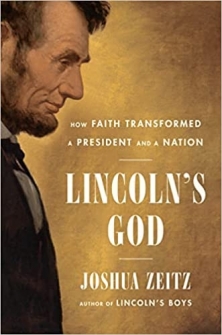"Lincoln could use humor as an explosive weapon as well as employing it as a constructive force... For Abraham Lincoln never told a story except with a purpose. He himself pointed this out often. His anecdotes were the precision tools of a highly skilled and intelligent wit... 'I laugh because I must not cry: That's all, that's all.'"
- from Amazon:

- from Amazon:

Click here to read another article about Lincoln's use of humor and story-telling.
Click here to read the back-story concerning the Star-Spangled Banner...
Here is a paragraph that was pulled from an interview with President Wilson in 1916 in which the bookish president remarked upon the various interesting aspects of President Lincoln:
"He was not fit to be president until he was president." As far as culture critic and all-around nay-sayer H.L. Mencken was concerned, Abraham Lincoln was simply another opportunist who fed at the federal trough and he found himself at a loss when it came to understanding the American deification of the man. It seemed that even Jefferson Davis might have had an easier time uttering a few sweet words to describe Lincoln then did the "Bard of Baltimore". Yet, there was one contribution Lincoln made that Mencken applauded, the Gettysburg Address:
"It is eloquence brought to a pellucid and almost gem-like perfection --the highest emotion reduced to a few poetical phrases. Nothing else precisely like it is to be found in the whole range of oratory. Lincoln himself never even remotely approached it [in other speeches]. It is genuinely stupendous."
(Although, like any unreconstructed Confederates, he thought the argument was all a bunch of rot.) Relying on the expertise of various Lincoln scholars (Paul M. Angle, Dr. William Barton, Reinhard Luthin and David Mearns), efforts were made to verify whether or not all the many aphorisms, bon mots, maxims and plentiful epigrams attributed to Lincoln were indeed authored by the slain president, or were they the product of the hundreds of forgers and prevaricators that followed in his wake. In this article, the controversial author and prominent chemist, Otto Eisenschiml (1880 – 1963), recalled the events that unfolded at Ford's Theater as Lincoln lay dying. A good deal of information is dispensed concerning the physical damage that was wrought by Boothe's derringer (pictured) - as well as the various life-prolonging measures that were implemented by the 23 year-old doctor who was first on the scene.
Ever since the age of photography began, one of the semi-official pastimes of the American people involves taking note of the rapid facial decay of their assorted presidents while in-office - and as the collected photographic portraits of Abraham Lincoln clearly indicate, no one will be naming a skincare product after him any time soon, however, the aging process that effected his face so dramatically has been the subject of Lincoln admirer's through the years, and some are collected in the attached article.
|